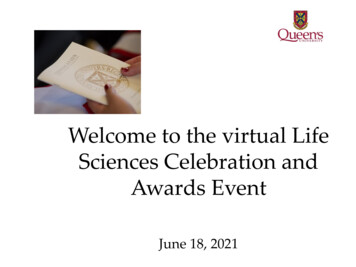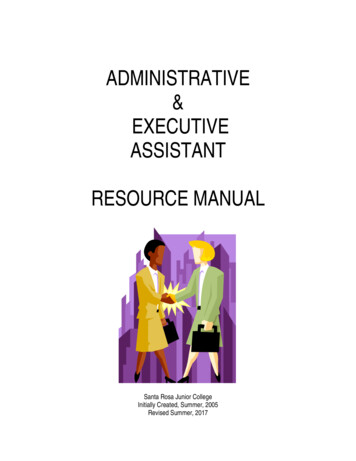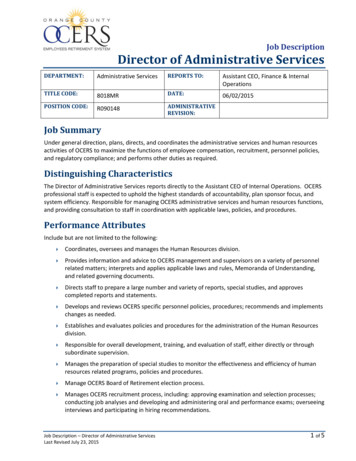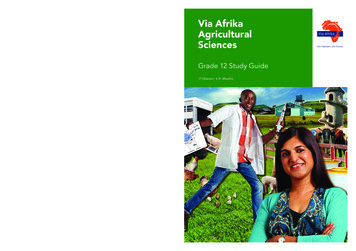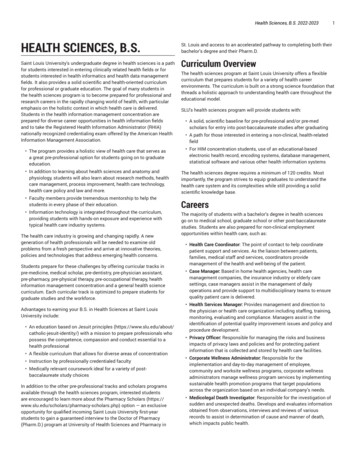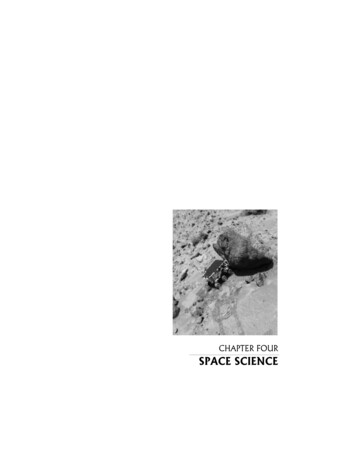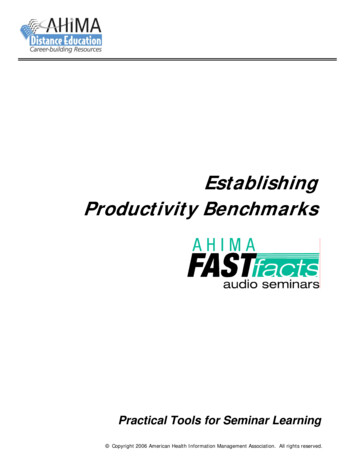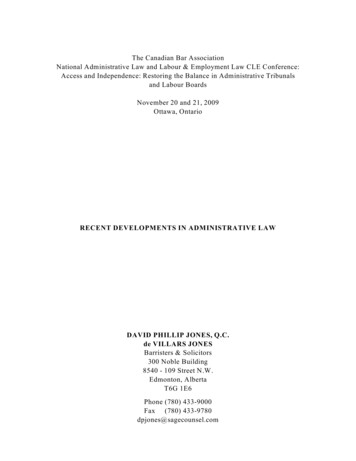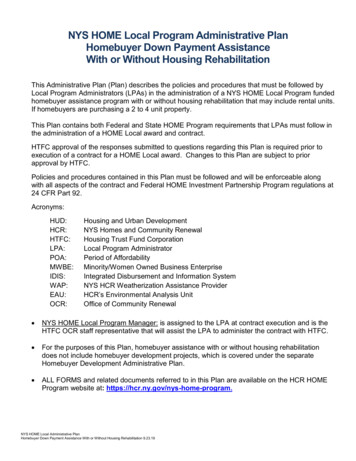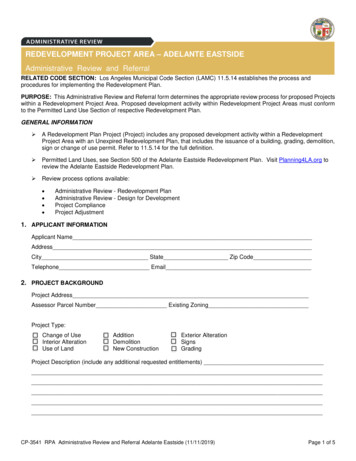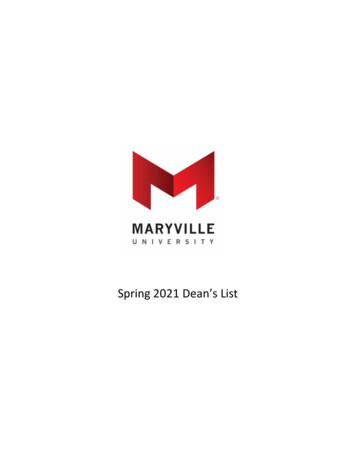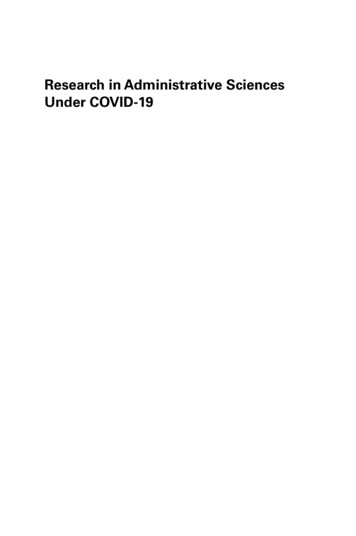
Transcription
Research in Administrative SciencesUnder COVID-19
This page intentionally left blank
Research in AdministrativeSciences Under COVID-19EDITED BYMÓNICA LORENA SÁNCHEZ LIMÓNUniversidad Autónoma de Tamaulipas, MéxicoandMARÍA LUISA SAAVEDRA GARCÍAUniversidad Nacional Autónoma de México, MexicoUnited Kingdom – North America – Japan – India – Malaysia – China
This page intentionally left blank
ReviewersDomestic:Dr Lorena Álvarez Castañón. Universidad de Guanajuato, MexicoDr Deyanira Bernal Domínguez. Universidad Autónoma de Sinaloa, MexicoDr Guadalupe del Carmen Briano Turrent. Universidad Autónoma de San LuisPotosí, MexicoDr Juan Carlos Centeno Maldonado. Universidad Autónoma de Coahuila, MexicoDr Rosario Cortes Castillo. Instituto Politécnico Nacional, MexicoDr Alejandro Ibarra Yúnez. EGADE Business School, Tecnológico de Monterrey,MexicoDr Pablo Daniel Palacios Duarte. Benemérita Universidad Autónoma de Puebla,MexicoDr Teresa Vargas Vega. Universidad Autónoma del Estado de Hidalgo, MexicoDr Paola Selene Vera Martínez. Universidad Nacional Autónoma de México,MexicoInternational:Dr Rosa Aura Casal de Altuve. Universidad de Los Andes, VenezuelaDr Carmen López Pérez. Universidad de Sevilla, SpainDr Rosana Melean Romero, Universidad de Zulia, VenezuelaDr Yorbeth Montes de Oca Rojas. Universidad Luis Vargas Torres de Esmeraldas,EcuadorDr Berta Silva Palavecinos. Pontificia Universidad Católica de Valparaíso, ChileDr José Luis Peña Alonso. Universidad de Burgos, SpainDr Mary Analí Vera-Colina. Universidad Nacional de Colombia, Colombia
Emerald Publishing LimitedHoward House, Wagon Lane, Bingley BD16 1WA, UKFirst published by ACACIA as La Investigación en Ciencias Administrativas ante elCOVID-19, 2021English language translation copyright 2022 Emerald Publishing Limited.This edition published under exclusive licence from ACACIA, A.C., by Emerald PublishingLimited.Translated by Tiziana Laudato. This book has been peer-reviewed.The moral right of the copyright holder and translator has been asserted.Reprints and permissions serviceContact: permissions@emeraldinsight.comNo part of this book may be reproduced, stored in a retrieval system, transmitted inany form or by any means electronic, mechanical, photocopying, recording or otherwisewithout either the prior written permission of the publisher or a licence permittingrestricted copying issued in the UK by The Copyright Licensing Agency and in the USAby The Copyright Clearance Center. Any opinions expressed in the chapters are thoseof the authors. Whilst Emerald makes every effort to ensure the quality and accuracy ofits content, Emerald makes no representation implied or otherwise, as to the chapters’suitability and application and disclaims any warranties, express or implied, to their use.British Library Cataloguing in Publication DataA catalogue record for this book is available from the British LibraryISBN: 978-1-80262-298-0 (Print)ISBN: 978-1-80262-297-3 (Online)ISBN: 978-1-80262-299-7 (Epub)
Table of ContentsAbout the Editors ixAbout the Contributors xiPreface xvPresentation xviiIntroductionMónica Lorena Sánchez Limón and María Luisa Saavedra García 1Part ICompanies and SMEsChapter 1 The Systemic Competitiveness of Latin American MSMEsUnder COVID-19María del Rosario Demuner Flores, María Luisa Saavedra Garcíaand Elsa Esther Choy Zevallos 5Chapter 2 The Contingency Approach to COVID-19 of SubsistenceBusinessesArcelia Toledo López and Dora Lilia Guzmán Cruz 31Chapter 3 Effects of the COVID-19 Pandemic on the Top SevenMexican Exporting CompaniesHéctor Alonso Olivares Aguayo and Ana Laura Medina Conde 49Part IIHuman Capital and Knowledge ManagementChapter 4 Multi-case Study of Knowledge Management at UNAM.Responses Under COVID-19María Guadalupe Calderón Martínez 67
viiiTable of ContentsChapter 5 The Impact of Burnout on University Workers’ Intention toQuit in Times of COVID-19Mónica Lorena Sánchez Limón, Mariana Zerón Félix andOscar Galván Mendoza 89Chapter 6 Issues that Impact Academic Stress When WorkingRemotely Under COVID-19: Scale ReliabilitySergio Madero Gómez and Oscar Eliud Ortíz Mendoza Chapter 7 Technostress in University Students as an Effect of theCoronavirus PandemicJulián Ferrer Guerra, Martha Ríos Manríquez andCarlos Alberto Moncada Sierra 99117Part IIIMarketing and Business StrategiesChapter 8 The Influence of E-commerce on Consumption Habits UnderCOVID-19 in the City of Durango, MexicoJosé Gerardo Ignacio Gómez Romero, Francisco MartínVillarreal Solís and Xochitl Escamilla Arango 137Chapter 9 Design Thinking as a Methodological Strategy for theEconomic Reactivation of Start-ups in Mexico Under COVID-19Guillermo Flores Téllez, Jaime Garnica González andHeriberto Niccolas Morales 155Chapter 10 Corporate Social Responsibility in the COVID Era.An Exploratory Literature ReviewAlan Francisco Rodríguez Jasso, Lucero de Jesús Rodríguez Jassoand Arturo Briseño García 177Index 193
About the EditorsMónica Lorena Sánchez Limón, PhD in Management from Universidad NacionalAutónoma de México, is a Full-time Professor at Universidad Autónoma deTamaulipas, School of Commerce and Administration, Victoria Campus and aMember of the National System of Researchers, Level II, and certified by theNational Association of Faculties and Schools of Accounting and Administration. She is also the National President of the Academy of AdministrativeSciences ACACIA, A.C. and a Member of the Academy of Management andEuropean Academy of Management. https://orcid.org/0000-0002-0671-0076María Luisa Saavedra García, PhD in Management from Universidad NacionalAutónoma de México, is a Full-time Professor at Universidad NacionalAutónoma de México, School of Accounting and Management and a Memberof the National System of Researchers, Level II. She is a recipient of the NationalUniversity Award in Teaching from UNAM, the National Vice President of Chaptersof the Academy of Administrative Sciences ACACIA, A.C., and the President of theResearch Commission of the Mexican Institute of Finance Executives. https://orcid.org/0000-0002-3297-1157
This page intentionally left blank
About the ContributorsArturo Briseño García, PhD in Administrative Sciences from EGADE BusinessSchool at Tecnológico de Monterrey, is a Research Professor at UniversidadAutónoma de Tamaulipas, School of Commerce and Administration, CiudadVictoria campus, a Candidate to national researcher at the National Systemof Researchers, and an Editor of the Ciencias Administrativas Teoría y Praxisjournal. https://orcid.org/0000-0002-6567-241XMaría Guadalupe Calderón Martínez, PhD in Economics and Management ofInnovation and Technology Policy from Universidad Complutense de Madrid,is a Full-time Professor at Universidad Nacional Autónoma de México, FESCuautitlán, Member of the Faculty of Tutors of the Graduate Programme inManagement Sciences at UNAM, Member of the National System of Researchers,Level I, and is responsible for the Entrepreneurship Chapter of the Academy ofAdministrative Sciences ACACIA, A.C. https://orcid.org/0000-0002-8257-9057Elsa Esther Choy Zevallos, PhD in Sciencies Accounting and Business fromUniversidad Alas Peruanas, is a Full-time Professor at Universidad NacionalMayor de San Marcos, School of Accounting Sciences. She is a Researcher withNational Scientific and Technological Registry, MR group, Level I, is a recipientof the Scientific Merit Award from the UNMSM, and is a Member of theInter-American Accounting Association Technical Commission of AccountingResearch. https://orcid.org/0000-0001-8580-8495María del Rosario Demuner Flores, PhD in Economic-Administrative Sciencesfrom Universidad Autónoma del Estado de Mexico, is a Full-time Professorat Universidad Autónoma del Estado de Mexico, School of Accounting andManagement and a Member of the National System of Researchers, Level I,with PRODEP Profile. She is the Director of Revista de Estudios en Contaduría,Administración e Informática. http://orcid.org/0000-0002-4542-9113Xochitl Escamilla Arango has a Master’s degree in Business Managementfrom Universidad Juarez del Estado de Durango, with emphasis in creationof micro-, small-, and medium-sized enterprises management and is a Fulltime research Professor in Software Engineering at Universidad Politécnica de
xiiAbout the ContributorsDurango and works at Guión Bajo 13, as Frontend Developer. https://orcid.org/0000-0003-0311-8939Julián Ferrer Guerra has a Master of Science in Information Systems from theInstituto Tecnológico y de Estudios Superiores de Monterrey. He is a ResearchProfessor at the Tecnológico Nacional de Mexico in Celaya, Department ofEconomic and Administrative Sciences and a Member of Acacia and theANFECA Academy. https://orcid.org/0000-0002-0178-8851Guillermo Flores Téllez, PhD in Industrial Engineering from UniversidadAutónoma del Estado de Hidalgo, is a Director of Research and Innovation ofthe Systematic Training Centre for the Development of Technologies, CASDT.He is the President of the World Hosin Kwonbub Federation, Mexico branchfor South Korea, the President of the Mexican Federation of Applied SportsSciences, Puebla, Mexico, and Vice President of the Mexican Association ofTRIZ for Mexico and Latin America. https://orcid.org/0000-0002-9881-4402Oscar Galván Mendoza, PhD in Administrative Sciences from la UniversidadAutónoma de Ciudad Juárez, is a Full-time Research Professor at UniversidadAutónoma de Baja California, School of Social and Management Sciences,Ensenada, Baja California and is a Coordinator of the Master’s programme intaxation at the same institution. He is a Candidate to national researcher of theNational System of Researchers and is a winner of first place in the NationalPostgraduate Thesis Award by ANFECA. https://orcid.org/0000-0001-6136-2214Jaime Garnica González, PhD in Strategic Planning and Technology Managementfrom Universidad Popular Autónoma de Puebla, is a Full-time Professor atUniversidad Autónoma del Estado de Hidalgo, Institute of Basic Sciences andEngineering and a Member of the National System of Researchers, Level I. Hehas been recognised three times by the World Hosin Kwonbub Federation fortechnological contributions and is responsible for the Operations Management,Engineering and Systems Management Chapter of ACACIA. He is a Member ofthe Mexican Association of TRIZ for Mexico and Latin America. https://orcid.org/0000-0002-2453-5144José Gerardo Ignacio Gómez Romero, PhD in Management from UniversidadAutónoma de Aguascalientes, is a Full-time Professor at Universidad Juárez delEstado de Durango, School of Economics, Accounting and Administration anda Member of the Academy of Administrative Sciences ACACIA. https://orcid.org/0000-0002-6322-6133Dora Lilia Guzmán Cruz has a Master’s degree in Management from InstitutoTecnológico de Oaxaca. She is a Full-time Professor at Instituto PolitécnicoNacional, CIIDIR Unidad Oaxaca, a Member of the Academy of NaturalResources Management at CIIDIR Oaxaca, and a COFAA-IPN Fellow. https//orcid.org/0000-0002-9815-3229
About the ContributorsxiiiSergio Madero Gómez, PhD in Economics and Business Management fromUniversidad de Deusto, San Sebastián campus, Spain, is a Full-time Professorat the Business School at Tecnológico de Monterrey, Monterrey N.L. and aMember of the National System of Researchers, Level I. He is the Vice Presidentof Committees of the Academy of Administrative Sciences and a Member of theAcademy of Management and the Academy of International Business. https://orcid.org/0000-0003-3996-7609Ana Laura Medina Conde, PhD in Law and Legal Argumentation fromUniversidad Autónoma de Tlaxcala, is a Postdoctorate in Law from Universidadde Zaragoza, Spain and a Full-time Professor at Universidad Autónomade Tlaxcala, School of Law. She is a Member of the National System ofResearchers, Level I and is responsible for the Legal Aspects in OrganizationsChapter of the Academy of Administrative Sciences ACACIA. https://orcid.org/0000-0003-4203-4383?lang enCarlos Alberto Moncada Sierra is a Mechatronics Engineer at the TecnológicoNacional de Mexico in Celaya. He is a Candidate for a Master’s degree inAdministrative Management at the Tecnológico Nacional de Mexico in Celayaand an Industrial Engineering Intern at Universidad Virtual del Estado deGuanajuato. He is the Cultural Representative of the state of Guanajuato in theUnited States, Canada, and Japan and Co-founder and former President of thealtruistic group Linces por el Servicio at the Tecnológico Nacional de Mexico inCelaya.Heriberto Niccolas Morales, PhD in Strategic Planning and TechnologyManagement from Universidad Popular Autónoma de Puebla, is a Full-timeProfessor at Universidad Autónoma del Estado de Hidalgo, Institute of BasicSciences and Engineering, Academic Area of Engineering and Architecture.He has a recognition of Desirable Profile by the Program for the Development ofTeaching Personnel (PRODEP) belonging to the Ministry of Public Education(SEP). He is a Member of the Mexican Association of TRIZ, A.C. https://orcid.org/0000-0002-6402-121XHéctor Alonso Olivares Aguayo, PhD in Economics from Instituto PolitécnicoNacional, is a Full-time Level B Research Professor at Universidad LA SalleMexico, Business School, Condesa Campus. He is a Candidate for NationalResearcher of the National System of Researchers and a Member of the MexicanActuarial College and the International Risk and Actuarial Association.https://0000-0003-2609-8627Oscar Eliud Ortíz Mendoza has a Master’s degree in TelecommunicationsAdministration from Tecnológico de Monterrey, Monterrey Campus and is aPhD candidate in Management from EGADE Business School at Tecnológico deMonterrey. https://orcid.org/0000-0001-6432-589X
xivAbout the ContributorsMartha Ríos Manríquez, PhD in Accounting and Auditing from UniversidadComplutense de Madrid, is a Research Professor at University of Guanajuato,School of Administrative Sciences, Campus Celaya’-Salvatierra. She is a Level IIResearcher of the National System of Researchers, PRODEP Profile Professor,responsible for liaison in the Academy of Administrative Sciences ACACIA,A.C., Member of the RAITES network, President of the International NetworkRENUTEG, Member of the research group in Spain ICGEEP, and Editor of theRAITES Journal and Acta Universitaria. http://orcid.org/0000-0002-3752-9886Alan Francisco Rodríguez Jasso has a Master’s degree in International Businessfrom Universidad Autónoma de Tamaulipas and is a student on the DoctorateProgramme in Administrative Sciences at Universidad Autónoma de Tamaulipas,School of Commerce and Administration, Ciudad Victoria Campus. https://orcid.org/0000-0001-9489-4874Lucero de Jesús Rodríguez Jasso has a Master’s degree in Business Administrationwith emphasis in Strategic Management from Universidad Autónoma deTamaulipas and is a Doctoral student in Administrative Sciences at UniversidadAutónoma de Tamaulipas, School of Commerce and Administration, CiudadVictoria Campus. https://orcid.org/0000-0002-7475-7685Arcelia Toledo López, PhD in Philosophy in Management from the EGADEITESM Business School, is a Full-time Professor at the Instituto PolitécnicoNacional, CIIDIR Unidad Oaxaca. She is a Member of the National Systemof Researchers, Level I, President of the Academy of Natural ResourcesManagement at CIIDIR Oaxaca, and is responsible for the SMEs chapter atthe Academy of Administrative Sciences ACACIA, A.C. https://orcid.org/0000-0002-2328-5438Francisco Martín Villarreal Solís, PhD in Management from UniversidadAutónoma de San Luis Potosí, is a Full-time Professor at Universidad Juárezdel Estado de Durango, School of Economics, Accounting and Managementand is responsible for the Organization Theory Chapter of the Academy ofAdministrative Sciences ACACIA. https://orcid.org/0000-0001-9251-5084Mariana Zerón Félix, PhD in Management from Universidad Autónoma deTamaulipas, is a Full-time Professor at Universidad Autónoma de Tamaulipas,School of Commerce and Administration, Victoria Campus and is a Member ofthe National System of Researchers, Level I, and responsible for the KnowledgeManagement Chapter of the Academy of Administrative Sciences ACACIA,A.C. She is ANFECA Certified Teacher. https://orcid.org/0000-0003-0584-6884
PrefaceFor centuries past, particularly the present twenty-first, we have witnessed a varietyof events that have pushed our planet to what we once thought was the limit.However, we had no idea what we would have to deal with when a new variantof a virus made its way across borders and turned into the very phenomenon weused to read about in history books: a pandemic. This book presents a variety ofsituations and topics presented in texts co-authored by renowned national andinternational academics under the coordination of Dr Sánchez Limón, Presidentof the Academy of Administrative Sciences ACACIA; and Dr Saavedra García,President of the Research Commission of the Mexican Institute of FinanceExecutives - IMEF.We are constantly receiving, consuming, and experiencing the effects of thepandemic whose prospective recovery I dare to call bleak and completely differentfrom what we have had to deal with in previous global crises. In this sense, the fiveareas on which this research focusses offer a series of strategic factors to supportthe indispensable and necessary reinvention - from this year and onwards - ofall organisations that contribute to our countries’ society and economy. The keyrole that foreign trade, micro-, small-, and medium-sized enterprises (MSMEs),human capital, marketing, and business strategies play in the quest to create amore sustainable and inclusive world is undeniable. Ideally, we should all havebeen proactively focussing our actions for decades, prioritising our societies’ survival. However, as the authors rightly point out, our country and region is madeup of a population dependent on subsistence businesses that was already struggling with constant challenges, including the closing of borders and a subsequentreinforcement of the global economic crisis derived from the sudden transition tothe virtual world.In this respect, this work is intended to offer added value in view of such atransition and contributes to the efforts to diversify services and products thatare undoubtedly underway. It also supports public awareness raising about the factthat any crisis requires the impact of our actions along the value chain to reach boththe target audience of each of our sectors and society as a whole. These pages echoa clear unison of voices that - while recognising the difficult scenarios in terms offoreign investment, limited foreign trade, the impact of whether a service or productis a basic need, and our societies’ affected purchasing power - also highlight theimportance of access to and mastery of technology, as well as the relevance ofthe human factor. Finally, I note that, indirectly, through the perspective of the
xviPrefaceeconomic and administrative sciences, this work brings to light just how negligentwe have been of the impact suffered intensively by our population during thepandemic and the need to provide an innovative and empathetic response to it.The impact of this work lies precisely in its attenuating approach to the complicated status quo and the joint work of the authors who, through different voicesand perspectives, offer us a glimpse of the reality that the populations of Mexicoand Latin America are experiencing in the field of management sciences. Thework stands out for its focus on the voices of national and regional producers, theincreasingly valued competitiveness, the indispensable value and understandingof human capital, the vital and necessary technology, and the understanding ofthe value of solidarity and responsibility towards society. I applaud the authors’imparting, throughout the research, of statistical data, methodologies, results,alternatives, and tools to improve our decision-making in light of today’s ‘newreality’. I hope you enjoy this as much as I have.Dr Eduardo Ávalos Lira,President of the Accrediting Council for Social,Accounting, and Administrative Sciences in Latin America.
PresentationCOVID-19 has forced states and economic and social agents to propose solutionsto the unforeseen and complex challenges of the pandemic. In this context,‘Research in Administrative Sciences Under COVID-19’ provides an exceptionalscientific approach from different areas of the administration to analyseand propose appropriate measures that will effectively contribute to curbingthe economic and social crisis triggered by the pandemic and recovering the‘normality’ that everyone longs for.The approach employed in this work is exemplary in terms of transferringthe knowledge that universities must provide in order to contribute to publicwell-being and social progress. The studies it includes address this objective in aprompt and innovative spirit. Its proposals are based on the factual situation, itsrationale and study, and are pragmatically projected so that they can be assessedand monitored. All the studies presented contribute to decision-making in public and private organisations for the design of economic and social reactivationpolicies that improve companies’ competitiveness and employment in COVID-19crisis.The work has been systematised into three main sections (Companies andSMEs, Human Capital and Knowledge Management, and Marketing and Business Strategies), reflecting the meticulous planning that went into delivering theproposed results. My sincere congratulations to the coordinators of the scientific work for their approach to the topics addressed and for their comprehensivestructure. The sequence of the different studies included is decisive in makingdecisions on how to overcome the pandemic, particularly considering its effectson micro-, small-, and medium-sized enterprises (MSMEs).Accordingly, the study on Latin American MSMEs competitiveness underCOVID-19 emphasises the commitment to the priority focus on the inclusivedevelopment of citizens in the closest regional environments in order to overcomevulnerability in terms of self-employment. The proposals made for strengtheningthe implementation of MSME policies and the design of the new programmesand practices presented will help to bolster the economy of the affected sectorsthrough entrepreneurship and self-employment. These proposals should be supported as launching pads for job creation and social recognition.In the economic and social situation described, research into the innovativeand proactive practices adopted by subsistence businesses makes it possible tomeasure the effort made and its evaluation as a reference of opportunities to adoptnew marketing and consumption habits. The reflections presented in the work
xviiiPresentationensure the reinforcement and singularisation of certain sales lines that must beconsolidated through diversification and the incorporation of new technologiesas guarantees of future permanence.Analysing the effects of COVID on the export sector makes it possible tomeasure the stability of national production and its safeguarding, while at thesame time helping to detect and promote opportunities and niches for new products with the greatest potential in pandemic situations. This line of research offersnew studies of particular reference for the adoption of reinforcement measuresfor the national industry.In all economic decisions and policies, knowledge management is a determining factor for company competitiveness, which in turn has a direct impact on aregion’s labour and social framework. The multiple case study of knowledge management at UNAM and the responses to COVID reinforce the need to link theuniversity to groups within society. The evaluation of these results must be decisive in modulating the mission and vision of a modern and competitive universityat the service of social well-being. The direct transfer of knowledge managementto companies in the shortest possible time is one of the university’s main objectivesat all times but particularly in such times of economic and social crisis.The study of the impact of burnout on the intention to quit among universityworkers in Tamaulipas is of particular interest. It offers an avenue for furtherresearch on staff training and response to unforeseen situations, specifically inovercoming the negative emotional states that the pandemic can engender. In thesame direction, the analysis and reflection on the factors that have an impact onthe academic stress associated with teleworking under COVID-19 and its effectson students opens up a line of research of maximum interest to implement strategies to strengthen a teaching-learning process that can favour comprehensivetraining, taking into account the high levels of stress and job burnout that theobligatory nature of online training can cause.Indeed, the obligatory use of technological procedures for work (teleworkingor virtual training) can lead in certain cases to situations of psychosocial suffering that directly affect the mental health of today’s students. The results obtainedfrom the study on technostress in university students on academic performancedemonstrate the need for an in-depth examination of the evolution of studentbehaviour and its direct effects on academic achievement, both from the perspective of the student and the teaching staff. We must not forget that excellence inthe acquisition of competences and skills in university education is the effectiveguarantee for the effective transfer of knowledge to society.The pandemic and ensuing confinement have automatically led to an expansion of e-commerce. This is clearly demonstrated by the study on the influenceof e-commerce on consumption habits under COVID-19 in the City of Durango.This significant expansion of e-commerce in times of pandemic calls for furtherresearch on its direct effects on the consumer and on the business sector.The public service nature of the proposed research questions the applicationof the design thinking methodology to promote the economic reactivation ofstart-ups. The application of this methodology appears to be useful as a guide tosteer the re-opening and re-launching of enterprises.
PresentationxixThis book concludes with a study of the effects of COVID-19 on corporatesocial responsibility. The literature review reveals that the pandemic has led to agreater understanding of socially responsible practices, which have been boosted bypublic policy actions with competitive advantages for companies. These favourablemeasures should continue to be encouraged to reinforce social responsibility at thecore of business, particularly in the service of the most vulnerable.In sum, as I mentioned at the beginning, ‘Research in Administrative SciencesUnder COVID-19’ is a compilation of excellent scientific papers of immediateresponse of knowledge transfer from the University to contribute to citizen wellbeing and social progress. My sincere congratulations to the coordinators of thepaper, Ms Mónica Lorena Sánchez Limón and Ms María Luisa Saavedra García,and to all the participants for the depth of their research and effective proposalsto help overcome the economic and social crisis caused by COVID-19.Dr José Luis Peña Alonso,Professor of Finance and Taxation Law,Universidad de Burgos, Spain
This page intentionally left blank
IntroductionMónica Lorena Sánchez Limón andMaría Luisa Saavedra GarcíaThe whole world is currently in the midst of a health, humanitarian, and economiccrisis unlike any other in this century. It has brought activities to a standstill dueto the voluntary or compulsory restrictions established in all countries. Giventhat the paralysis of productive activities and the contraction of demand augursa slow recovery, there is great uncertainty as to how long the crisis will last andwhat prospects there are for recovery.Faced with this scenario, the governments of all countries have had to adoptmeasures to combat the spread of COVID-19. This has had serious consequencesfor world economies, which have paralysed an important part of their productionoperations, starting with Asia, then Europe, followed by North America, LatinAmerica, and the rest of the world. It has also resulted in border closures, leadingto a worrying rise in unemployment with the inevitable fall in demand for goodsand services. Indeed, it is estimated that the contraction in world output will begreater than in any past crisis since the Second World War and even greater thanthat recorded during the Great Depression, with recovery expected to be slow.The Academy of Administrative Sciences ACACIA, A.C., in congruence withits vision of ‘Contributing to social progress by promoting excellence in scientific research and professional practice of those dedicated to the disciplines ofAdministration and related areas, both in Mexico and internationally’, presentsthis book in response to the context surrounding organisations under COVID-19and the challenges of administration. This book is the product of the researchefforts of 23 outstanding researchers belonging to 12 Mexican higher educationinstitutions and 1 Latin American institution.This book is also intended to help organisations prepare to deal with theravages of the pandemic and provides information on how to do so throughadministrative practices. It is considered that the contribution of this work will befundamental given that to date, there is no literature on the subject in the Mexicanand Latin American contexts. The themes of this book have been organised into10 chapters that deal with aspects related to companies, their competitiveness,focus, and export capacity under COVID-19. Others have developed themes onintellectual capital, burnout, stress, and technostress, as effects of the pandemic onorganisations’ human capital. Finally, it addresses corporate social responsibility,Research in Administrative S
British Library Cataloguing in Publication Data A catalogue record for this book is available from the British Library ISBN: 978-1-80262-298- (Print) . Dora Lilia Guzmán Cruz has a Master's degree in Management from Instituto Tecnológico de Oaxaca. She is a Full-time Professor at Instituto Politécnico Nacional, CIIDIR Unidad Oaxaca, a .
